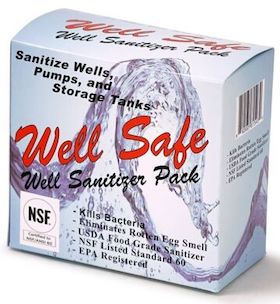
Curated with aloha by
Ted Mooney, P.E. RET

The authoritative public forum
for Metal Finishing 1989-2025

-----
High Silica in Borewell Water
Q. We are facing problem of silica carry-over with steam and silica deposit in super heater tube inside & on turbine rotor in our borewell water silica content increase up to 28 ppm. We process borewell water as under softener-RO-DM Plant-Mix Bed unit but at mixed bed outlet silica content found 0.5 ppm.
At RO permiate silica is 5 ppm,
What should we do; please suggest.
fertilizers - bilaspur,chattisgarh, India
October 15, 2015
Cleaning rust and corrosion from inside a water well casing
Q. I have recently refurbished an old water well. I have replaced all of the above ground equipment and piped the supply to my garden, which was the purpose for refurbishing the well in the first place. I, for the first time, this past weekend set up the sprinkler to water the garden, and in a matter of minutes noticed there was no water coming out. After checking and rechecking the equipment , I have come to the conclusion that I have a weak water supply. Not that the ground has no water, but that the ground water cannot enter the well casing.This is, from what I gather from talking to some well diggers in my area, by reason of design. My well casing is 6" in diameter and runs approximately 60' into the ground. The water is allowed into the well casing by means of narrow slots cut into the walls of the casing. From what I'm told, over time rust and corrosion along with mud and gravel can plug these slots, thus keeping water from entering the well casing faster than the pump can pump it out.
My question is, how can I clean the rust from the well casing, without removing it, which would be impossible since the house is built over the top of it. I have been told to use muriatic acid, except if I think the well is surrounded by limestone rock, which I think it is. They say the muriatic acid will react with the rock and cause an eruption. Is this true? I was then told to use bleach. Would bleach have the desired effect on rust? What about vinegar
⇦in bulk on
eBay
or
Amazon [affil links] ? Would this have the desired effect on rust? Remember whatever I use will be diluted by the water in the well. I was also told to use air to break up the rust and possible debris. Could you offer any other possible solutions or suggestions?
Hobbyist - Louisville, Kentucky, USA
June 2, 2010
A. Try 5-10% ammonium citrate solution(50-100 gm citric acid/1 lit water+add some ammonia+pH must be 3,5).Hope it helps and good luck!
Goran Budija- Cerovski vrh Croatia
A. The vinegar might work. Using citric acid would be a nice step between the vinegar and the Muriatic/HCl acid. How much water do you think is in the casing when not pumping? How many feet up the 6" casing does the water go?
I'd use 10% citric acid . Heated would be better.
Is there any way to pump it out and then back down the well? If so, I'd figure a way to pump water out, add the citric acid , add heat and then pump it back down into the well.
Acids, even the "safer" ones, don't do much in cold temperatures. The old rule of thumb is... for every 20 degrees below 70 you drop... the power of the solution is cut in half. But, for every 20 degrees you raise the temperature above 70, the power is doubled.
Just a wild suggestion. I am also partial to citric acid . Effective and safe, albeit slow.
- El Dorado, Arkansas
![]() Thank you for your suggestions. I'll give it a try.
Thank you for your suggestions. I'll give it a try.
- Louisville, Kentucky, U.S.A.
June 10, 2010
How to removed dissolved oxygen from borewell water
February 19, 2018ACRONYMS:
DO = dissolved oxygen
RW = raw water
ACF = activated carbon filter
RO = reverse osmosis
Q. We have Dissolved Oxygen (DO) from Borewell water source.
We have RW Tank + ACF + RO as treatment.
Does this help in DO removal or we need to put in extra treatment?
- KL, Malaysia
Q, A, or Comment on THIS thread -or- Start a NEW Thread
